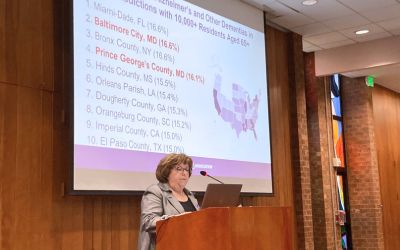Dementia Series Helps Caregivers Navigate Memory Loss
For Carla Rawlings, a retired social worker now caring for her mother with dementia, a University of Maryland Graduate School conference offered valuable insight into managing her mother’s worsening memory loss.

Ilene Rosenthal, director, Greater Maryland Alzheimer's Association, presents at the GGEAR "Navigating Dementia" conference.
Rawlings attended the May 10 “Assessment Tools” workshop, part of the Geriatrics and Gerontology Education and Research (GGEAR) Program’s five-part “Navigating Dementia” series. Hosted by GGEAR with support from the Maryland Department of Aging, the community education series aims to provide support and resources to caregivers, aging services professionals, and anyone with an interest in matters concerning older adults.
“She’s strong-willed,” said Rawlings, who monitors her mother on an in-home camera system linked to her phone. “And she doesn’t recognize that she has memory loss. She’ll say, ‘What are you fixing for dinner,’ and then five to 10 minutes later she’ll ask, ‘What are you fixing for dinner?’ ”
Across Maryland, there are an estimated 110,000 people over 65 living with Alzheimer’s or related dementias and nearly 240,000 unpaid family members proving care. Nationwide, nearly 7 million Americans have dementia, a number projected to rise rapidly as the population ages, according to the Alzheimer’s Association.
“Dementia represents a public health crisis that will only intensify,” said keynote speaker Ilene Rosenthal, MSW, director of the Greater Maryland Alzheimer’s Association. “Early detection allows patients to access treatments and plan for their future care needs.”
The conference covered screening methods that can detect early signs like struggling with finances or medications — signs often missed as merely “senior moments.”
“There is a lack of awareness about what symptoms signal dementia rather than typical age-related changes,” said Rachel McPherson, PhD, a postdoctoral fellow at the University of Maryland School of Nursing who discussed a screening tool called the AD8, an eight-item questionnaire designed to screen for mild dementia. “Raising awareness and increasing screenings could allow more timely diagnosis.”
GGEAR director Diane Martin, PhD, MSL, MA, agrees that there is a fundamental lack of understanding about the aging process. “We’re raising awareness of the differences between normal aging and cognitive decline indicating underlying dementia,” Martin said. “Our goal is to promote earlier detection and better care for this growing population.”
It’s not just unpaid caregivers who lack knowledge about older adults. Most health care providers receive only a few hours of geriatric training, and trained geriatricians are retiring and not being replaced. Martin warns of a looming crisis. “When we’re thinking about geriatricians, people who are board-certified in geriatric medicine, we have less than 500 in the country. Not in the state of Maryland — in the country,” she said.
GGEAR aims to fill that gap by educating caregivers and students as well as facilitating interdisciplinary research and professional development. The program takes students from across the University System of Maryland to training locations with older adults.
“We’re working from medically underserved areas in Baltimore City, to the mountains of Western Maryland, to the Eastern Shore,” Martin said. “We want students to go to these sites so they can see the lack of services and they can interact with older adults that have dementia.”
GGEAR intern Charnissa Boulware, who will earn a master’s in gerontology from the Graduate School in December, said more education is needed to create a workforce equipped to care for the growing older adult population.
“I want more people to get into gerontology,” said Boulware, who added that elder care is not limited to doctors. “As you see at this conference, you can be a social worker, you can be a pharmacist, you can do support groups. There are a lot of career opportunities for this important work.”
Rawlings, who shares caregiving responsibilities with siblings, said she will share the information she gathered during the “Navigating Dementia” series with her family.
“My sister, who isn’t in health care, really needs to understand how my mother operates with her memory issues,” Rawlings said. “This is difficult, and the more you know, the better you can handle it.”
The full “Navigating Dementia” series is available online. Another series is being planned for fall 2024.



